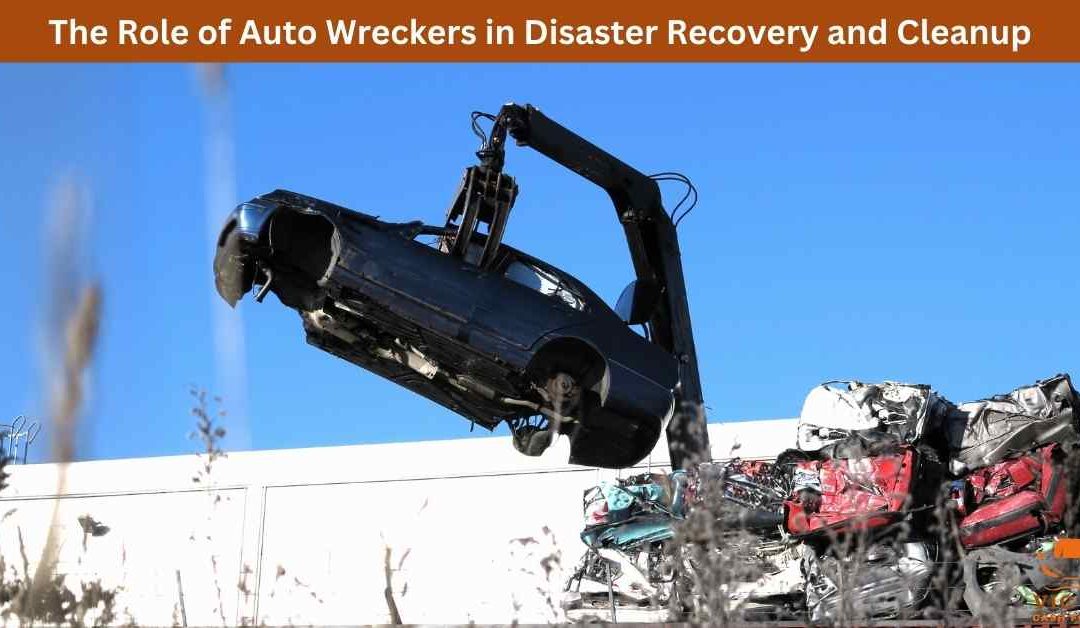Natural disasters, such as floods, hurricanes, wildfires, and earthquakes, can leave behind widespread destruction, including the devastation of vehicles. In the aftermath of these events, auto wreckers play a crucial role in disaster recovery and cleanup efforts. Their expertise and resources help restore order, ensure public safety, and contribute to environmental sustainability. This article explores how auto wreckers contribute to disaster recovery and the vital services they provide during such critical times.
1. Rapid Removal of Damaged Vehicles
One of the primary roles of auto wreckers in disaster recovery is the swift removal of damaged and destroyed vehicles from affected areas. In the wake of a disaster, roads and public spaces are often littered with wrecked cars and trucks, posing safety hazards and obstructing emergency response efforts. Auto wreckers respond quickly to clear these vehicles, allowing for the safe passage of emergency services, utility workers, and cleanup crews.
a. Facilitating Emergency Response
By removing damaged vehicles promptly, auto wreckers help emergency responders reach affected areas more efficiently. This is particularly important in situations where time is of the essence, such as during search and rescue operations or when providing medical aid to disaster victims.
b. Reducing Traffic Congestion
Clearing roads of wrecked vehicles also reduces traffic congestion, which can be a significant issue in the aftermath of a disaster. This ensures that supplies and personnel can move freely, aiding in the overall recovery process.
2. Environmental Cleanup and Hazard Mitigation
Disasters can lead to the release of hazardous materials from vehicles, such as fuel, oil, and other fluids. Auto wreckers play a critical role in mitigating environmental risks by safely handling and disposing of these substances.
a. Proper Disposal of Hazardous Materials
Auto wreckers are trained to identify and manage hazardous materials found in vehicles. They carefully drain and dispose of fluids like gasoline, oil, and coolant, preventing them from contaminating soil and water sources. This is essential for protecting the environment and preventing further harm to communities already impacted by the disaster.
b. Recycling and Salvaging Parts
In addition to hazardous material management, auto wreckers contribute to environmental sustainability by recycling and salvaging usable parts from damaged vehicles. Metals, plastics, and other materials are recovered and processed, reducing the amount of waste that ends up in landfills. This not only helps in the cleanup process but also supports the circular economy by reusing valuable resources.
3. Supporting Local Economies
Auto wreckers play a vital role in supporting local economies during disaster recovery. By salvaging parts and recycling materials, they create jobs and provide economic opportunities in communities that may be struggling to rebuild.
a. Job Creation
The demand for auto wrecking services often increases after a disaster, leading to the creation of temporary and permanent jobs. This influx of employment opportunities can provide much-needed financial support to local residents during a difficult time.
b. Supplying Affordable Parts
Salvaged parts from wrecked vehicles can be sold at a lower cost than new parts, providing an affordable option for people needing to repair or replace their vehicles after a disaster. This is particularly important for those who may not have insurance coverage or who are facing financial difficulties as a result of the disaster.
4. Collaboration with Government and Relief Agencies
Auto wreckers often work closely with government agencies, insurance companies, and disaster relief organizations to coordinate recovery efforts. Their collaboration is essential for ensuring that vehicles are removed safely and efficiently, and that the cleanup process proceeds smoothly.
a. Coordinating with Local Authorities
Auto wreckers often receive directives from local authorities on where and how to focus their efforts. This coordination helps prioritize areas with the greatest need, such as clearing access routes to hospitals, shelters, or disaster response centers.
b. Assisting Insurance Claims
Auto wreckers also play a role in assisting with insurance claims by providing detailed assessments of vehicle damage and facilitating the process of writing off totaled vehicles. This helps speed up the claims process, allowing disaster victims to receive compensation more quickly and begin the process of recovery.
5. Preparing for Future Disasters
In addition to their immediate role in disaster recovery, auto wreckers contribute to long-term preparedness efforts. By learning from each disaster, they can improve their response strategies and ensure that they are ready to act quickly and effectively in the future.
a. Investing in Equipment and Training
Auto wrecking companies invest in specialized equipment and training to handle the unique challenges posed by disasters. This includes acquiring heavy-duty tow trucks, cranes, and other machinery capable of handling large-scale vehicle recovery operations. Continuous training ensures that their teams are well-prepared to deal with hazardous materials and other complexities that arise during disaster recovery.
b. Developing Emergency Response Plans
Many auto wrecking companies work with local governments and emergency services to develop and refine disaster response plans. These plans outline the procedures for vehicle removal and environmental cleanup in the event of a disaster, ensuring a coordinated and efficient response.
Conclusion
Auto wreckers are unsung heroes in the aftermath of natural disasters, playing a crucial role in recovery and cleanup efforts. Their ability to swiftly remove damaged vehicles, manage hazardous materials, support local economies, and collaborate with relief agencies makes them an indispensable part of the disaster response team. As the frequency and severity of natural disasters continue to rise, the importance of auto wreckers in disaster recovery will only grow. By investing in technology, training, and preparedness, the auto wrecking industry will continue to be a vital resource in helping communities rebuild and recover after disaster strikes.
If you are in Moorabbin, Victoria 3189, and looking for cash for cars Melbourne service, this is the best way to visit us.
VIC Top Cash For Cars
2 Rochford Pl, Narre Warren South VIC 3805
(03) 7035 7828


Recent Comments